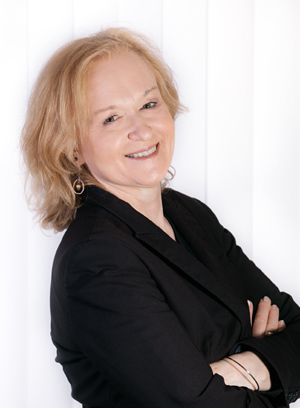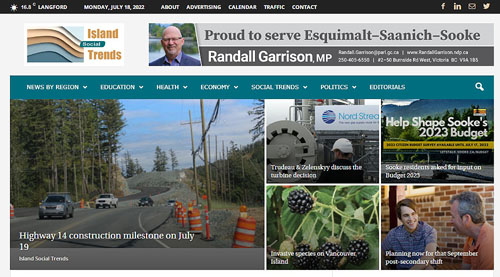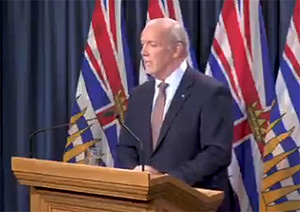
Monday July 18, 2022 | SOOKE & LANGFORD, BC
Editorial by Mary P Brooke| Island Social Trends
Five years ago there was a political seismic shift in BC. Not only did the NDP form government through a creative alliance with the BC Greens, governance in BC was for the first time coming significantly from a Vancouver Island mindset, as Premier John Horgan (MLA for Langford-Juan de Fuca which includes Sooke) took the reins of power for British Columbia.
The big day of swearing-in at Government House in July 2017 was a day to remember. After 16 years of BC Liberal governance that clearly set some economic and social sectors apart and behind from others, Horgan’s leadership swept in a new era for this province.
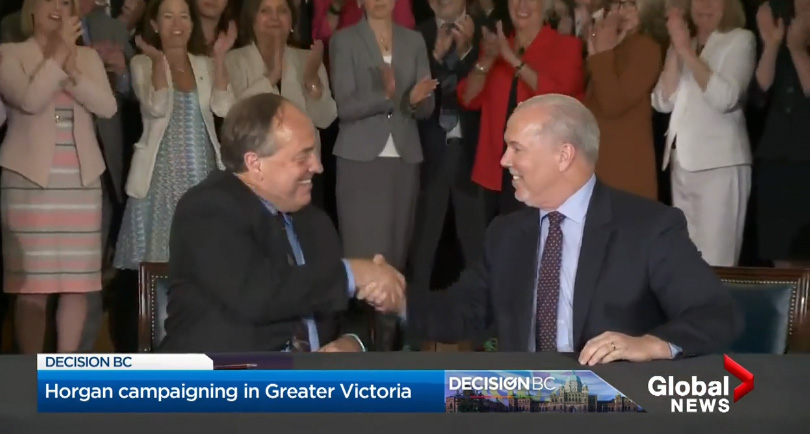
From day one Horgan told his cabinet to work every day like it was their last day. There was much to be achieved within the BC NDP vision of putting people first and leaving no one behind. His team never wavered from that level of commitment, adapting as they went along if things got missed (like the complete miss on advising people about the health dangers of the June 2021 heat dome) or as monumental challenges arose (like repairing major highways after the November 2021 floods).
Almost from the start, Horgan’s five-year leadership path was deluged with significant and unprecedented challenges. Almost right away in summer 2017 there was the worst wildfire season to date. In 2020 the pandemic hit and consumed about two years of government management focus not only from a public health perspective but also the challenges of immediate economic impacts and then a new phase of economic recovery. In fall 2021 there were massive floods that highlighted the food sustainability and economic supply chain issues of Vancouver Island and the entire province. This year BC has responded to receiving an influx of Ukrainian refugees.
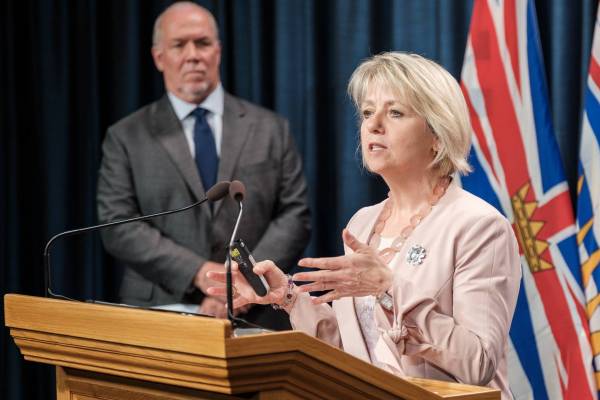
That Horgan is stepping back from BC NDP party leadership (and the Premiership) this fall, comes arguably at the peak of his accomplishments. Locally, it comes as several long-term projects have seen fruition (including the community sport box in Sooke) or will soon achieve completion (like the improvements on Highway 14 in the spots where road conditions were clearly dangerous). Some projects have a longer trajectory, such as the food distribution hub in Victoria which is building momentum to reprocess ‘rescue food’ from the retail grocery system while offering jobs and training to disenfranchised worker sectors. Some projects are still in relative infancy, like a serious overall of emergency management systems. Dealing with the health care workforce crisis might take longer.
Without Horgan’s vision to include people in the political equation, there would not be the collective sigh of relief that was felt during the COVID-19 pandemic as various supports were rolled out (even topping up the federal CERB, CEWS and other programs). Without the Horgan vision in education there would like not be as many schools getting seismic upgrades and playgrounds being built without having to rely on fundraising by parents.
Horgan did seem to offer a blind eye to some parts of the five-year journey. He let public health take the lead arguably for too long, not really stepping in with a policy of communication excellence during the COVID-19 pandemic crisis.
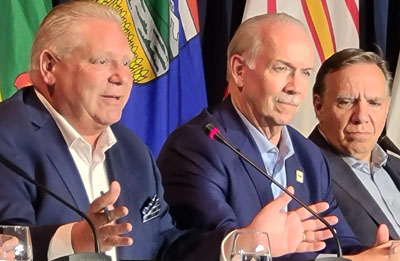
With something of a mellow tone — produced from his first bout of cancer years ago upon a foundation of a spiritual belief about leadership being for all not a few — Horgan has used politics to change society for everyone.
To single out one achievement where he pushed back against the narrow business belief about the cost of child care, now business leadership in BC heralds the importance of child care as an economic policy ‘not a social policy’ (as if the two were ever separate). The Horgan thumbprint of marrying together people and the systems that govern them is indelible.
As well, Horgan has taken his people-matter approach to the federal stage, this past year chairing the Council of the Federation (Canada’s Premiers), hosting the 2022 meeting in Victoria last week. He has, as such, set things in motion for an overall of the Canada Health Transfer so that health care is better funded across Canada in the years ahead.
It should not be understated the importance of leaving behind a younger generation of leadership in the BC NDP. As the Premier’s job opens up, the current Attorney General David Eby is expected to rise into that position. Other leadership around him would be strong, including Ravi Kahlon guiding the economic development file, Lana Popham delivering top marks for agriculture and food management, and Rob Fleming presently leading in infrastructure and transportation. Some even younger MLAs from the BC mainland regions are coming up within the political system. Horgan has been careful to pick cabinet members (half of which are women) with specific interests to achieve, but who have not been ‘single issue’ candidates in their ridings.
The Indigenous file has grown remarkably under Horgan’s leadership, the last few years in good hands with Murray Rankin (MLA for Oak Bay-Gordon Head), who was previously a federal MP.
Premier John Horgan’s Statement on 5 years of BC NDP government:
Premier John Horgan today July 18, 2022 has issued the following statement to mark the five-year anniversary of forming a government that puts people first:
“When our government was sworn in five years ago today, we committed to putting people at the centre of everything we did. We said that we would work hard every day to make life better and more affordable for British Columbians. While we have faced unprecedented challenges we could never have imagined then, I am proud of the progress we have made and the results we have delivered.
“From Day 1, we’ve made different choices. We put people first. We rolled up our sleeves and took on the biggest problems – problems that were years in the making.
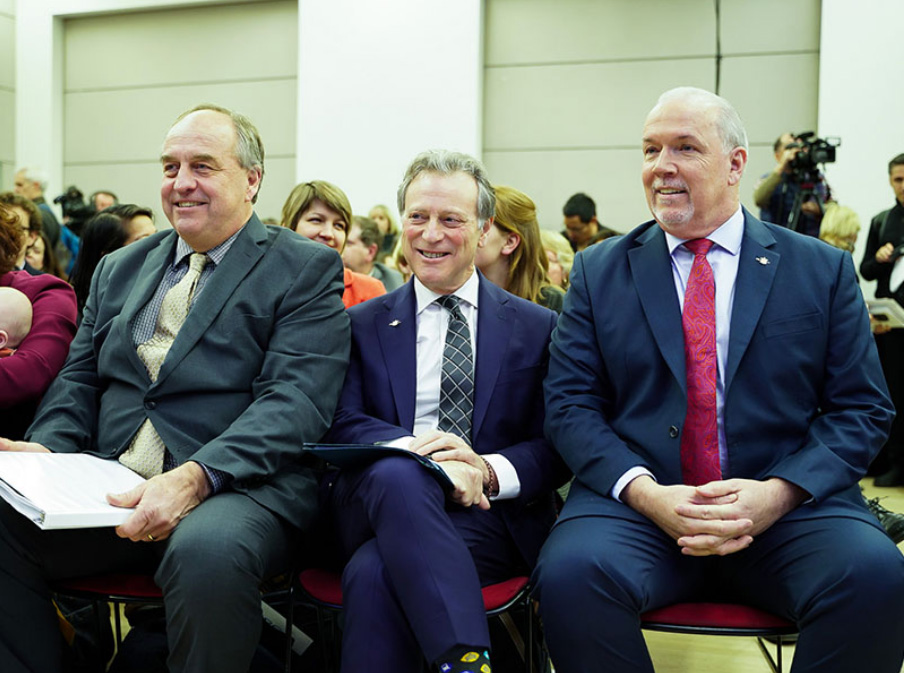
“We immediately set out to clean up politics by taking big money out of campaigns and introducing tough new lobbying rules. Instead of handing tax breaks to the wealthiest few, we asked the top 2% to pay their fair share so we could invest in the services and supports families rely on.
“Across the province, we have built schools and hospitals that people need. We have made child care more available and more affordable. We cracked down on real-estate speculation and got to work building thousands of homes people can afford. And we have helped bring down costs for families by eliminating MSP premiums and slashing ICBC rates.
“British Columbia is now an internationally recognized leader in fighting climate change, with North America’s most progressive plan to reduce emissions. In B.C., we are now developing our resources more responsibly and protecting our natural spaces in partnership with First Nations, as the first province in Canada to enshrine the UN Declaration on the Rights of Indigenous Peoples into law.
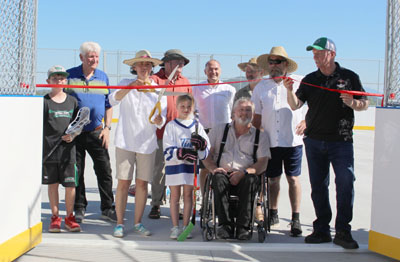
“When a global pandemic hit, we responded by supporting British Columbians. We acted quickly to help keep people working, protect those who lost their jobs and provide a lifeline to small businesses. And when wildfires and flooding devastated communities, we were guided by the same values – providing help to people on the ground and working to reopen highways in record time.
“Putting people first has helped us build the strongest economic recovery in the country. Today, more people in B.C. are working than when COVID-19 first struck. Wages continue to rise, and child poverty has been cut by more than 50% from 2016 levels. When people go to work, they are better protected with five days of paid sick leave, the highest minimum wage among all provinces and fewer barriers to joining a union.
“We have accomplished a lot for people in just five years, but there is still more to do. After the challenges we have faced in the past few years, many people are exhausted and feeling squeezed. They are worried about rising inflation and access to primary health care. In the months to come, our government will continue to take concrete action to support people, strengthen public services and make life easier for families. We will also keep pushing the federal government to fund its fair share of health-care costs so we can improve our cherished public system and make sure people get the best care possible in their time of need.
“I have never been more optimistic about the future of our province. We have been through a lot together. But we have shown that we can overcome anything if we look out for each other and work with a common purpose. I know our whole government will keep the focus on helping people so we can continue to build a better and stronger B.C. – one that works for everyone and leaves no one behind.”
===== ABOUT THE WRITER:
Mary P Brooke, Editor, Island Social Trends has been covering news of the Sooke and west shore regions since 2008, following Premier John Horgan’s rise up the political structure of BC. She is an active member of the media in Greater Victoria and BC, also covering federal news when there is a Vancouver Island angle.
The news publication series began with MapleLine Magazine (2008-2010), then the weekly print Sooke Voice News (2011-2013), and then West Shore Voice News in print/PDF format (2014-2020), before relaunching to cover the full South Vancouver Island Region with the IslandSocialTrends.ca news portal in mid-2020.
This publication was based out of Sooke from 2008 to 2017, and since 2017 has been based in the other side of Horgan’s riding in Langford.
Ms Brooke holds a B.Sc. in health science (with a public education component and second major in sociology), graduating from the University of Saskatchewan (including winning the English Department’s McGeachy Prize in Journalism there). She holds a Certificate in Public Relations from the University of Regina. At one time she held her BC Real Estate Licence, and in 1993-95 arguably raised the bar for real estate marketing excellence in the Greater Victoria area.
Mary P Brooke wrote and taught the inaugural curriculum at the Western Academy of Photography in Victoria in 1991-92 and around that time also co-founded the Professional Editors Association of Vancouver Island (PEAVI). In 1996-1997 she helped launch an organization in Victoria that helped people learn HTML and web design.
In 2000 Ms Brooke was recognized by National Post Business for launching an online e-learning portal (which ran to 2012). In the mid-2000’s she also wrote articles on positive living which were published internationally in nine languages, and edited and published other people’s books through her own company Brookeline Publishing House Inc.
In 2010-2013 Mary Brooke launched and operated the MapleLine Business Centre storefront print shop and Sooke Voice News newspaper office in Sooke, winning the Sooke Region Chamber of Commerce award for Community Service in 2010.
In 2020 Ms Brooke launched the fully online Island Social Trends, published by Brookeline Publishing House Inc, as a growing socioeconomic exploration of the South Vancouver Island region. In 2021 Mary Brooke earned a highly intensive Digital Marketing Certificate from Alacrity Canada. She has some books in the works, to launch her phase as an author.
Mary is the mother of four now-grown children, who attended public education in SD61, SD62 and SD72. Her family experienced the impact of the BC Liberal government on schools and families during 2001-2016.
===== RELATED:
Canada’s premiers: priorities for economic recovery & health care (July 13, 2022)
Day 2 in Victoria: Premiers hone in on health care priorities (July 12, 2022)
Day 1 in Victoria: Premiers discuss health care funding (July 11, 2022)
Trudeau wishes Horgan well on upcoming retirement on eve of Canada Health Transfer discussions (June 29, 2022)
Looking back at Horgan on the west shore, in photos (June 28, 2022)
Premier Horgan not seeking reelection in 2024 (June 28, 2022)







